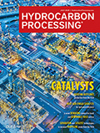Utilities
Understanding and applying radiometric level and density profiling
There are several reasons to quantify and qualify the material properties of liquids in vessels and pipes.
Lummus acquires water and wastewater treatment technologies from Siemens Energy
Lummus Technology announced that it has reached an agreement with Siemens Energy to acquire assets from their water solutions portfolio including intellectual property and copyrights, trade secrets, and research and development properties. The technologies address water and wastewater needs of the oil and gas industry using carbon adsorption, biological treatment and hydrothermal processes.
Digital Technologies: Do not just monitor bad actor machines: Start when they are healthy
Often, facilities hesitate to invest in monitoring rotating equipment until the machine fails. By that time, there is no background information, such as vibration or temperature data, to help site engineers diagnose the machine’s failure. However, by implementing a remote monitoring solution on healthy equipment, users can set a baseline of machine health to gain essential insights when the machine begins to fail.
SABIC setting its sights on the electrification of ethylene production
SABIC has signed an agreement with Coolbrook to assess Coolbrook’s Roto Dynamic Reactor (RDR) technology in support of decarbonizing ethylene production.
AWS unveils startups selected for the Clean Energy Accelerator 3.0 program
Amazon Web Services (AWS) announced the startups selected for the Clean Energy Accelerator 3.0. The program is designed to facilitate collaborations with mature startups developing breakthrough clean energy technologies.
Dow and X-Energy to build first grid-scale, next-generation nuclear reactor for NA industrial sites
Dow and X-energy said they have agreed to develop and demonstrate the first grid-scale next-generation nuclear reactor for an industrial site in North America.
Sustainable steel/chemicals production: Removal of impurities for valorization of steel mill gases
Industry faces significant challenges relating to the transition toward cleaner energy and more sustainable feedstocks.
IRPC 2022: Solution for safe, reliable, process measurements
On day 1 of IRPC in Houston, Texas, Ben Cammack, Chief Operating Officer for Clearguard, delivered a presentation titled, “Keep Plugging Away! The Solution for Safe, Reliable, Process Measurements.”
Pressure swing adsorption vessels fatigue analysis
The hydrogen (H<sub>2</sub>) plant in a refinery produces high-purity (99.9+ vol%) H<sub>2</sub> products using a licensed pressure swing adsorption (PSA) purification process to fulfill the H<sub>2</sub> makeup needs of refinery hydroprocessing facilities.
Process Control, Instrumentation and Automation: Distillation column DCS control configuration
Is there a consensus about a distillation column distributed control system (DCS) control strategy? Much has been written about this topic, covering configuration possibilities, constraints and interacting control considerations.

- Britain will not bail out bioethanol industry hit by Trump trade deal 8/15
- Russian energy facilities targeted recently in drone attacks 8/15
- Shell: Norco, Louisiana (U.S.) refinery gasoline unit work to start on Friday 8/15
- Sanctions-hit Indian refiner Nayara in talks with govt to sustain operations 8/15
- The API challenges Trump plan to cut biofuel import credits 8/15
- IAG selects record 29 startups for accelerator program 8/15




